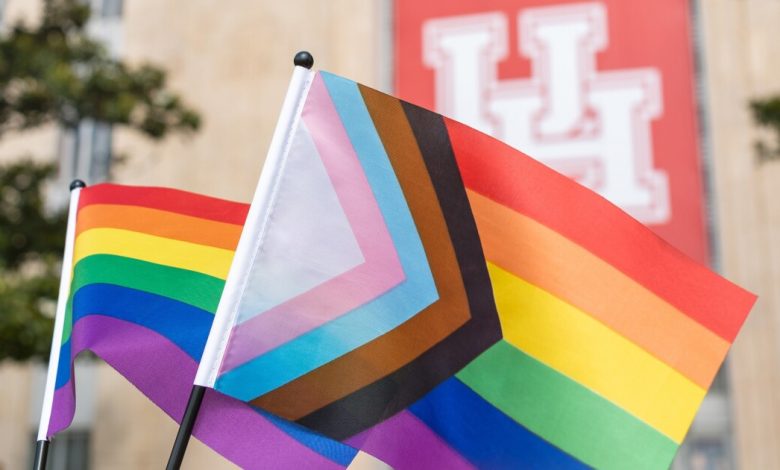For Transgender Students, Title IX Changes Could Reopen Doors Closed Under Trump

[ad_1]
Shane Windmeyer remembers the influx of calls to Campus Pride in 2016, when then-President Barack Obama’s Education Department told colleges that sexual orientation and gender identity were protected under Title IX. Community college leaders wanted to know how they could support their transgender students, beyond the letter of the law, said Windmeyer, the organization’s founder and executive director.
That’s the kind of effort Windmeyer is hoping to see this year in response to the Biden administration’s proposed Title IX regulations. If adopted, the rule would codify rights for LGBTQ students, which were not observed under the Trump administration’s interpretation of Title IX.
Transgender-rights experts and Title IX coordinators say the new rules would be a positive step in making their campuses more inclusive. The rules would allow trans students to use facilities that correspond with their gender identity, prohibit bullying based on gender identity, and ensure students are referred to with the correct pronouns. Colleges found in violation of Title IX can be investigated and risk losing federal funding.
Notably, the proposed rules do not address the participation of transgender students in sports. The Biden administration has said that a separate notice of proposed rulemaking will address that issue, which has become a political football for state lawmakers.
Twenty conservative state attorneys general are already suing to keep the Department of Education from enforcing its previous Title IX guidance indicating that sexual orientation and gender identity are protected, saying their states are at risk of losing federal funding if they do not comply. In new court filings this week, the states noted that the department is relying on this interpretation to support the draft regulations.
Education Secretary Miguel Cardona laid out the stakes in a prepared statement when the proposed regulations were released last week.
“Together, we must seize this opportunity to better protect LGBTQ youth who face bullying and harassment, experience higher rates of anxiety, depression, suicide, too often grow up feeling that they don’t belong,” he said.
‘Shoot For the Ceiling’
For transgender college students, the stakes are particularly high, as they are at increased risk for suicide and other mental-health issues, according to research.
The Williams Institute, a think tank based at the University of California at Los Angeles, published the results of a survey in April in which more than half of transgender students reported that their mental health was poor while they were attending higher-education institutions. More than a third reported that they experienced bullying, harassment, or assault as a student.
The Institute’s report on the survey stresses the importance of the Department of Education amending Title IX regulations to include gender identity and sexual orientation.
It also calls on colleges to include gender identity and sexual orientation in their nondiscrimination policies; invest in LGBTQ student-resource centers; designate gender-neutral bathrooms; evaluate the availability of gender-inclusive housing; and communicate the processes for changing gender designations and names in college records.
On some campuses, those changes are already in the works. In 2020, when the Trump administration’s Title IX regulations took effect, Elizabeth Trayner, the director of equitable rights and responsibilities and Title IX coordinator at the University of the Pacific in California, updated the university’s policies to make clear to the campus community that they could not be discriminated against for their gender identity or sexual orientation. Many other campuses have similar policies.
Trayner said her institution’s policies against sexual misconduct, discrimination, and retaliation are “far more expansive than what was required in the 2020 regulations.”
Those regulations, crafted under former Education Secretary Betsy DeVos, “set a floor for us … in that this is the bare minimum of what we have to do,” Trayner said. “We shoot for the ceiling in offering protections that are greater than what we’re legally mandated to give. The DeVos era said you don’t have to worry about your trans students, your trans faculty or staff. But it doesn’t say that we can’t provide those protections.”
For the University of the Pacific, Trayner said, the changes proposed by the Biden administration would only make technical differences, since they already have the nondiscrimination policy in place.
Robert Wood, a Title IX coordinator at Gwynedd Mercy College in Pennsylvania, echoed that sentiment, saying the Catholic institution has worked to foster an inclusive environment for its LGBTQ students, including raising a pride flag on campus last year.
“I don’t think anybody is perfect,” Wood said of creating an inclusive campus. “But there’s not an attempt to not be perfect. There’s not an attempt to ignore or not care about it or across the board, from our straight community to our LGBTQIA community — there is not an attempt to push something under the rug if something surfaces. And sometimes as you’re moving through your process, you realize, hey, we can do a little bit better job with this part.”
Trayner said that at some institutions, the regulations would be a much bigger deal and could create antitrans backlash.
On her campus, “it could still have some backlash. It could be that it’s under the radar for some folks who may be antitrans on campus and just haven’t noticed that this has happened.”
‘Peace of Mind’
Trayner said that currently, some transgender students feel isolated from their cisgender peers, who are concerned about saying the wrong thing.
“There’s a lot of fear of the unknown, there’s a lot of misunderstanding or not knowing how to act or stumbling around,” Trayner said. “What should I be saying? What language should I be using? Am I going to use the wrong pronoun? So people around [transgender students] start to stumble and not know what to do. And so, in the absence of not knowing what to do, people do nothing.”
Windmeyer, of Campus Pride, said changing laws and policies won’t directly improve trans students’ mental health. It’s how the larger community responds to those changes that will determine whether those students feel supported.
Landon Richie, a rising junior at the University of Houston and a transgender man, said the proposed protections will give LGBTQ students more recourse to combat discrimination.
“I think it would give trans and gender-nonconforming students a lot of peace of mind to know that there are protections for them in the event of discrimination,” he said. “At U of H, there are robust and inclusive protections for LGBTQ students on campus, but not all university campuses are like U of H. So having these federal protections will be really important for students who do come into contact with discrimination.”
Richie said he’s hoping the Department of Education will release regulations that require colleges and K-12 schools to allow transgender athletes to play on sports teams that correspond with their gender.
He mentioned that in Texas, a new law prohibits transgender youth from playing on the sports teams they align with. The law, which went into effect in January, requires that public-school students play on the sports teams that align with the sex on their birth certificate.
“Having [Title IX] guidelines being higher than what the state is saying would open back up those doors that have been closed and hopefully allow trans youth to feel that they are being respected at the highest level of government,” Richie said.
[ad_2]
Source link






